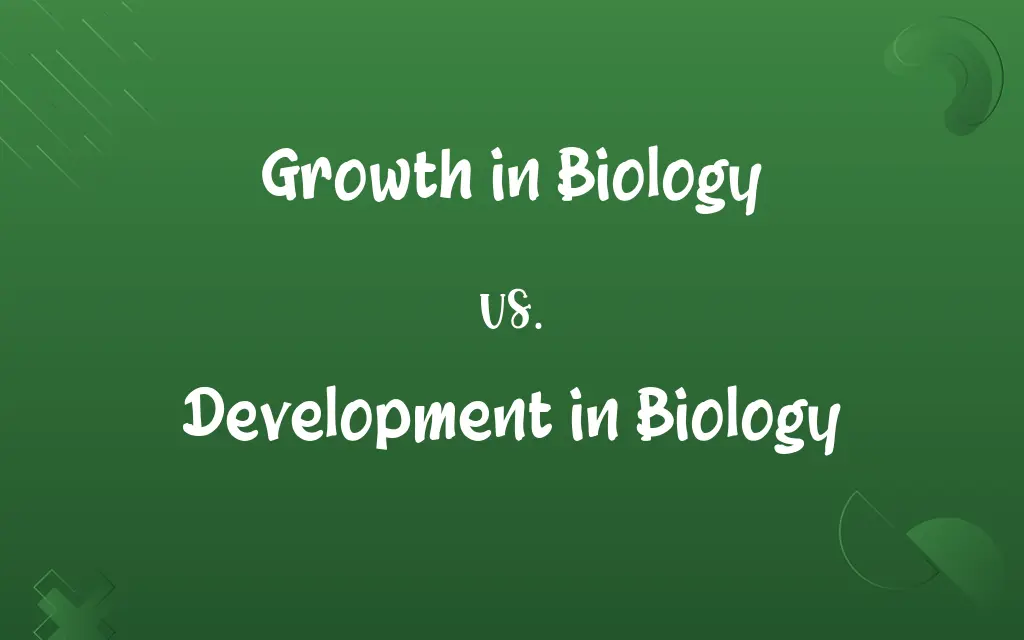Growth in Biology vs. Development in Biology: Know the Difference

By Shumaila Saeed || Published on February 15, 2024
In biology, growth refers to an increase in size or number of cells, while development involves the overall changes and differentiation in an organism's lifecycle.

Key Differences
Growth in Biology refers to the quantitative increase in size and mass of an organism or its parts, often through cell multiplication. Development in Biology encompasses the broader process of an organism's maturation, including differentiation and changes in form and function over its lifecycle.
Shumaila Saeed
Feb 15, 2024
Biological Growth is measurable, typically seen as an increase in length, height, and weight. Biological Development involves qualitative changes, like the transformation from a tadpole to a frog, encompassing both physical and functional changes.
Shumaila Saeed
Feb 15, 2024
During Growth in Biology, organisms or cells simply become larger. In contrast, Development in Biology involves more complex processes, including morphogenesis (forming of structures) and differentiation (cells taking on specific functions).
Shumaila Saeed
Feb 15, 2024
The focus of Growth in biological terms is often on physical expansion, which can occur throughout the organism's life. Development usually follows a specific sequence and pattern, integral to the organism reaching maturity.
Shumaila Saeed
Feb 15, 2024
Growth can sometimes occur independently of development, as in cases of cell proliferation without differentiation. Development typically involves a coordinated process where growth is one component among many, such as changes in shape, structure, and functionality.
Shumaila Saeed
Feb 15, 2024
ADVERTISEMENT
Comparison Chart
Definition
Increase in size or number of cells.
Overall changes and differentiation in an organism's lifecycle.
Shumaila Saeed
Feb 15, 2024
Type of Change
Quantitative, measurable changes.
Qualitative changes, including physical and functional transformation.
Shumaila Saeed
Feb 15, 2024
Processes Involved
Mainly cell enlargement and multiplication.
Includes morphogenesis, differentiation, and maturation.
Shumaila Saeed
Feb 15, 2024
Focus
Physical expansion.
Pattern and sequence of changes leading to maturity.
Shumaila Saeed
Feb 15, 2024
Independence
Can occur without development.
Encompasses growth as part of a broader set of changes.
Shumaila Saeed
Feb 15, 2024
ADVERTISEMENT
Growth in Biology and Development in Biology Definitions
Growth in Biology
Accumulation of biomass in an organism.
The growth of the fungus was rapid under optimal conditions.
Shumaila Saeed
Jan 22, 2024
Development in Biology
Transformation and specialization of cells in an organism.
The development of stem cells into different tissues is a key research area.
Shumaila Saeed
Jan 22, 2024
Growth in Biology
The physical expansion of biological entities.
Observing the growth of crystals in a petri dish was fascinating.
Shumaila Saeed
Jan 22, 2024
Development in Biology
Maturation involving differentiation and growth.
The caterpillar's development into a butterfly is a classic example.
Shumaila Saeed
Jan 22, 2024
Growth in Biology
Enlargement of structures in an organism through cell proliferation.
The growth of new branches in the tree indicated healthy development.
Shumaila Saeed
Jan 22, 2024
ADVERTISEMENT
Development in Biology
The sequence of physical and functional changes in an organism's lifecycle.
Studying the development of the chick inside the egg provided insight into avian biology.
Shumaila Saeed
Jan 22, 2024
Growth in Biology
An increase in cell size or number in an organism.
The rapid growth of the plant was evident in its increased height.
Shumaila Saeed
Jan 22, 2024
Development in Biology
Progression through distinct stages of biological change.
Human development from infancy to adulthood involves various stages.
Shumaila Saeed
Jan 22, 2024
Growth in Biology
Progressive increase in the size of an organism or its parts.
The tadpole's growth was monitored daily.
Shumaila Saeed
Jan 22, 2024
Development in Biology
The process of an organism evolving from a simple to a more complex form.
The development of the embryo into a fetus is a critical stage.
Shumaila Saeed
Jan 22, 2024
Repeatedly Asked Queries
What is the main focus of growth in biology?
The main focus is the increase in size and number of cells.
Shumaila Saeed
Feb 15, 2024
What are key features of development in biology?
It involves differentiation, maturation, and morphological changes.
Shumaila Saeed
Feb 15, 2024
How is growth measured in biology?
Through parameters like size, height, weight, and cell number.
Shumaila Saeed
Feb 15, 2024
Can growth occur without development?
Yes, growth can occur without developmental changes, like in cell proliferation.
Shumaila Saeed
Feb 15, 2024
Is development just physical growth?
No, it involves more than physical growth, including functional and structural changes.
Shumaila Saeed
Feb 15, 2024
Can development occur without growth?
In some phases, development can involve changes that don't include growth.
Shumaila Saeed
Feb 15, 2024
Does development follow a specific pattern?
Yes, it often follows a specific sequence and pattern.
Shumaila Saeed
Feb 15, 2024
How does cell differentiation relate to development?
It's a key aspect, where cells specialize and contribute to an organism's complexity.
Shumaila Saeed
Feb 15, 2024
Are growth and development mutually exclusive?
No, they often occur together but can also happen independently.
Shumaila Saeed
Feb 15, 2024
Is growth in plants different from animals?
The basic concept is similar, but the specific processes and patterns can vary.
Shumaila Saeed
Feb 15, 2024
Does development always mean getting bigger?
Not necessarily, it can involve changes in form and function without size increase.
Shumaila Saeed
Feb 15, 2024
What is the role of hormones in growth?
Hormones like growth hormones play a significant role in regulating growth.
Shumaila Saeed
Feb 15, 2024
Are all developmental changes visible?
Some changes, like cellular differentiation, are microscopic.
Shumaila Saeed
Feb 15, 2024
What signifies the completion of development?
The attainment of reproductive capability and full maturation signifies completion.
Shumaila Saeed
Feb 15, 2024
Can environmental factors affect growth?
Yes, factors like temperature, nutrition, and light can impact growth.
Shumaila Saeed
Feb 15, 2024
Can growth be reversed in biology?
Generally, growth is not reversible, but size can decrease due to factors like atrophy.
Shumaila Saeed
Feb 15, 2024
What triggers growth in organisms?
Factors like genetics, nutrition, and environmental conditions can trigger growth.
Shumaila Saeed
Feb 15, 2024
Is growth a continuous process?
In many organisms, growth is continuous, while in others, it may be periodic.
Shumaila Saeed
Feb 15, 2024
What is the endpoint of development?
Typically, it's the organism reaching its mature, fully differentiated state.
Shumaila Saeed
Feb 15, 2024
How is development studied in biology?
Through observational and experimental studies of organisms over their lifecycle.
Shumaila Saeed
Feb 15, 2024
Share this page
Link for your blog / website
HTML
Link to share via messenger
About Author
Written by
Shumaila SaeedShumaila Saeed, an expert content creator with 6 years of experience, specializes in distilling complex topics into easily digestible comparisons, shining a light on the nuances that both inform and educate readers with clarity and accuracy.







































































